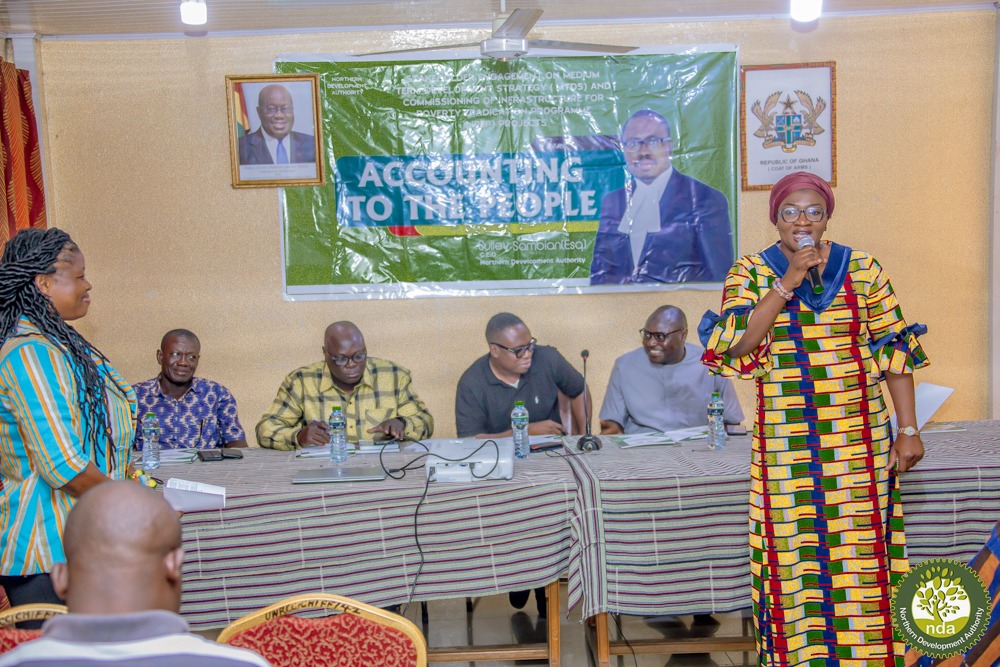By Bajin D. Pobia
Wa, May 21, GNA -The Northern Development Authority (NDA) has organised a stakeholder engagement on its 2023 -2027 Medium Term Development Strategy (MTDS), which serves as an agenda for the rapid transformation and job creation in the Northern Savannah Ecological Zone (NSEZ).
The five-year development Strategy hinged on five thematic areas, including Healthcare delivery, Education, Agricultural transformation and food security, Environment and sustainability, and Poverty and inequalities.
The strategy would prioritise jobs and livelihoods, tackle issues on gender and social inclusion and embrace actions to enhance climate justice and build resilience, and integrate and address the systemic challenges confronting the Northern Savannah Ecological Zone.
It also fed into many ongoing national policies and programmes including reducing poverty, improving health and educational outcomes, biodiversity conservation, industrialisation, and digitalisation among others.
Its actions also conform with the globally agreed Sustainable Development Goals (SDGs).
Mr. Sulley Sambian, the Chief Executive Officer of the NDA, in a statement, said the MTDS were designed to achieve the greatest possible impact for the people and communities in the NSEZ with a special focus on poverty reduction, job creation, and sustainable production systems.
“The Strategy will lead to actions that will extend the economic agency of women, men and young people, and groups across the frontiers. It is a zone that trails the rest of the country in major development and socio-economic metrics and actions targeting impactful changes should be rapid, robust, and interconnected”, he said.
He said actions that would be pursued in the next five years would be integrated and emanated from the series of consultations with development partners, policymakers, development experts, communities, farmers, and various interest groups.
Mr. Sambian emphasised that the Strategy would adopt a holistic approach, as a more effective response to the systemic challenges confronting Northern Ghana.
“For instance, a child is unlikely to successfully enroll and complete school in a context of extreme poverty; a farmer’s output, no matter the level of efforts will be challenged by a deteriorating environment and climate; and all gains made in any endeavour including infrastructural development will not be sustained in an atmosphere characterised by conflicts, threats of hostilities and mutual mistrust”, he pointed out.
Mr. Sambian said under the Strategy, the NDA would work around six main objectives, including increasing household incomes, accelerating human development through access to quality social services, and promoting private sector actions capable of delivering board-based and inclusive growth.

Sustaining livelihoods by developing capacity on land governance, biodiversity conservation, and climate change and enhancing social cohesion, peace, and security, which could make enormous contributions to progressive and inclusive change at scale are some of the objectives of the Strategy.
Mr Sambian said the strategy would also recognise coordinating efforts of internal organisations in ensuring that together, they would build a professional, resilient, and accountable organisation with a focus on the socio-economic transformation of Northern Ghana.
Mr. Sam Danse, the Director for Corporate Affairs and International Relations at the NDA responsible for Gender, Social Protection, and Corporate Affairs, in a presentation of the MTDS, noted that under the five years period, the NDA anticipated to increase household incomes in Northern Ghana by 20 percent through sustainable agricultural production systems by 2027.
He explained that agriculture-related activities were the biggest employer and main driver of the NSEZ’s economy and many households in the area were engaged in crop farming, producing cereals, roots, tubers, and legumes, and in terms of rice production, “the zone is a major contributor to national Outputs”.
The agriculture sector employs about 74 percent of the zone’s labour force and accounts for about 34 percent of national crop production while 15.6 percent of the NSEZs land size is dedicated to agriculture.
Mr Danse noted that only about 15.4 percent of arable land in the zone was put under cultivation implying over 8 million hectares of agricultural land suitable for the cultivation of different food crops either lay fallow or underutilised, creating enormous opportunities for investors to undertake productive investments in the agriculture sector with the potential to create jobs and promote livelihoods.
He said despite the zone’s agricultural potentials, it was affected by a number of challenges largely driven by over-reliance on primary production methods and a weak market orientation.
Traditional rulers, municipal and district chief executives, civil society and nongovernmental organisations, heads of decentralised departments, farmers, women groups, security agencies, and a cross-section of the public attended the forum.
GNA